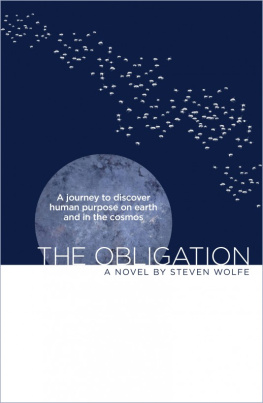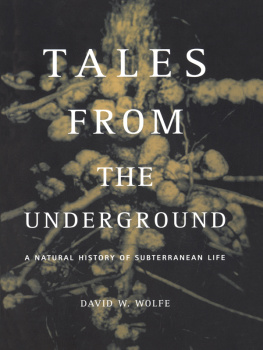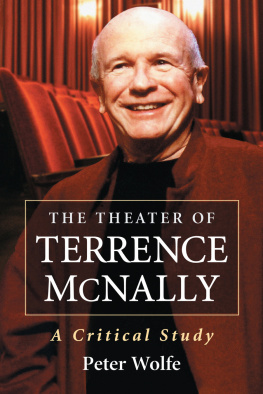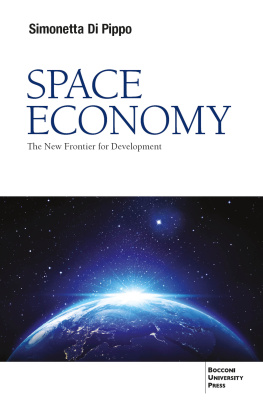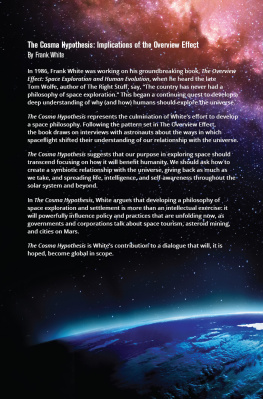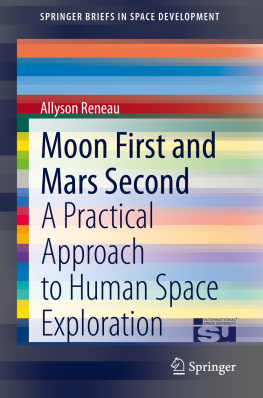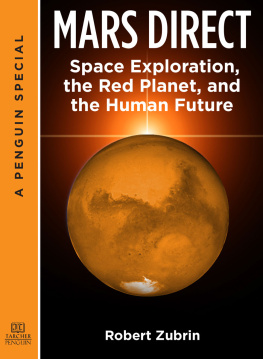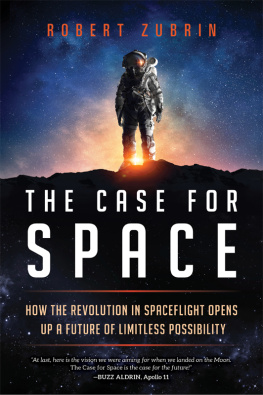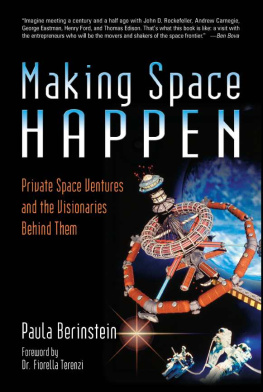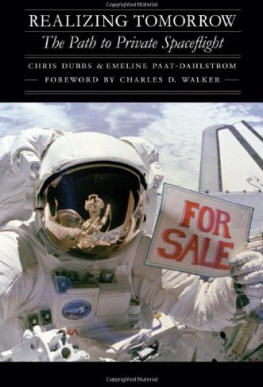THE OBLIGATION
A Novel
by
Steven Wolfe
Copyright, by Steven Wolfe,2013
Smashwords Edition
All rights reserved
ISBN: 9781301057986
Edited by Erin Medlicott
Smashwords Edition, License Notes
This ebook is licensed for your personal enjoymentonly. This ebook may not be re-sold or given away to other people.If you would like to share this book with another person, pleasepurchase an additional copy for each recipient. If youre readingthis book and did not purchase it, or it was not purchased for youruse only, then please return to Smashwords.com and purchase yourown copy. Thank you for respecting the hard work of thisauthor.
For Stacey, Zoe and Bram
Table of Contents
1. The Plaque
While I waited for Mr.Grant to finish editing the remarks I had written for him, my eyeswandered once again to the plaque that occupied a minor spot on thewall behind his mahogany desk. The small object was easily lostamong an impressive display of photographs, awards and othermementos that chronicled a long career in politics. Its smoothsurface was covered in a thick lacquer. The maple wood grain wasprominent but did not obscure the engraved lettering.
In simple bold font, the plaque read:The colonization of space will be the fulfillment ofhumankinds Obligation to the Earth.
Mr. Grant looked up unexpectedly and caughtthe direction of my gaze. He paused for an instant as our eyes met.He grunted a weak smile and returned to his editing.
I was on the job a week or so when I firstnoticed the plaque. I didnt think much of it or the inscribedwords, but I soon found myself preoccupied about its meaning andwhat relevance it had to Mr. Grant. When I asked other staffersthey had nothing particular to say about it. I could find no onewho shared my curiosity for the object.
I made up my mind that I would take theopportunity to ask Mr. Grant about the plaque during that meeting.What harm could it do? If nothing else, it was a chance to bondwith the congressman on a personal level, which Id been wanting todo anyway for some time.
I sat silently in the straight back armchairnext to his desk as he read through the draft statement I hadwritten for him to read during an appropriations subcommitteehearing on the 1992 NASA budget. The draft offered praise andsupport for the Presidents proposed agenda for NASA, and suggestedsome modest changes that Mr. Grant felt would help NASA betterfulfill its mission.
I thought about the statement and how itcompared to the inscription on the plaque. Both had to do withouter space. That much was true. Yet, the distance between thecapabilities of the American space program at that time and thefanciful vision of space colonies engraved on the plaque were eonsapart.
Congressman Harrison B. Grant, a Democratrepresenting the 38st District of California, was a bearof a man. His massive hands swallowed the fountain pen he used toedit my draft. Though his suit was of quality wool and welltailored it rumpled quickly under the stress of his brawny frame.Despite his thirty years in public office, he still looked moresuited to pitching bales of hay on the Inland Empire family farmwhere he grew up than crafting national space policy.
I had come to work for Mr. Grant four monthsearlier, just out of grad school. My plan was to accrue a few yearsof practical Washington experience before applying to law school.National space policy was one of five broad issue areas that Istaffed for the congressman though I had no particular backgroundin the subject other than a degree in political science. I alsocovered health care, taxation, agriculture and energy. I was eagerto learn as much as I could and welcomed the heavy workload thatcame with the Hill job.
When he finished his task he handed me themarked pages, Not bad. Make these changes and well be allset.
As I gathered my materials, I prepared tocasually ask about the plaque, but he spoke first. Are you up tospeed on the Weinstein amendment?
Yes, I answered after taking a moment torecall the topic. Mr. Weinstein wants to zero out funding for thespace station. I understand hes tried that before without gettingmuch traction. Committee staff says hes not expected to be anymore successful this year.
Really? Ive heard otherwise. In fact, Ihear he has a damn good chance of success this time around. Isquirmed, knowing my own information was probably a week old.
A larger effort is building this year tocancel the space station altogether and Im already feelingpressure to take sides. Weinstein and his coalition think they havea real shot this time. With NASA having already spent, or wastedas they say, $10 billion on the program with little to show for itso far, they certainly have a point. Lets keep on top of that,alright?
Yes, of course.
Instead getting up to leave, I took themoment as planned and ask, That plaque, Mr. Grant? Ive beenwondering for a while now I froze in mid-sentence as his faceshifted from a flat expression to one of intense interest.
After a beat I continued, Ive beenwondering, what is the meaning of the saying on that small woodplaque in the corner there? He did not turn to see where Ipointed, but merely stared at me for an agonizing ten secondswithout saying a word. I wanted to fill the silence, but had nofacility to speak. He studied me as if he never before noticed myexistence. I panicked that I had made a major blunder.
Then with a shrug he turned to anotherfolder on his desk and sniffing dismissively said, Its a gift Ireceived once. He seemed to be about to add something, but onlysaid, Ill need those edits as soon as you can get them tome.
I should have obediently gotten up and goneabout the task of updating the paper, but something held me back.Something in the way Mr. Grant stared at me for so long, as thoughhe was sizing me up in some way. I almost felt he was decidingwhether or not I was worthy to receive an explanation about theplaque, and had decided I wasnt.
Despite my better judgment, I pressed himagain. Ill get right to that, Mr. Grant. But, about the plaque.Theres something very unusual about it. What is itreferencing?
With uncharacteristic intensity he glared atme. And, why does it matter to you? Its just another quotationlike thousands you see everywhere. He was impatient with me, butnot angry. Does this speak to you in some way?
I was taken by his challenge. I stammered ashe waited for my reply. IIt doesnt particularly speak to me,butat the same time I cant help feeling there is somethingfamiliar about the quote. I think I must have heard it beforesomewhere.
He studied me again as he did a momentbefore. Well, forget it. Its nothing worth your remembering. Hewas less gruff, but still wanted to end the conversation.
I wanted to press him further, but hewouldnt allow it, saying only, Can you have those remarks back tome in an hour?
I assured him I would and left. Rather thansatisfying my curiosity, Mr. Grants reaction only heightened myinterest in the plaque.
***
The amendment to cancel the space stationproved to be a serious challenge. It was only two days later that adelegation of about a dozen members from the Coalition forResponsible Federal Spending, the CRFS, crowded into Mr. Grantsoffice to make their case. There were not enough seats for everyoneto sit, so a few of the junior lobbyists and I stood along thewall.
Every year the VA benefits get cut more andmore. Brave men and women give everything for this country, andinstead of taking care of their medical needs when they come home,we are spending billions on joy rides into space. Bill Hogan, awheelchair-bound Vietnam War veteran, got right to the point. Heleaned forward with a white-knuckle hold on the arms of his chair,his face flush with emotion. Mr. Grant told Bill about his ownmilitary service and how he fought in the Battle of the Bulge inWWII. Bill respected that, and his grip relaxed.

